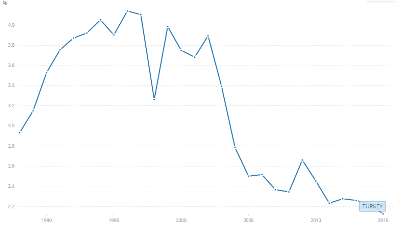
Reflecting on the recent events in Turkey, Dani Rodrik wrote over at Project Syndicate that he never thought he would see such events “in a country that has come to hate military coups but still loves its soldiers”. Knowing little of detail about the particular dynamics of current Turkish politics, I wondered if there was any way to make sense of this.
My colleague Gabriel Leon does work on riots and coups. In 2014 he published a paper in Public Choice on military spending and coups d’etat where he shows that coups are more likely when military spending as a share of GDP is relatively low. The paper uses data on successful and failed coups in 153 countries between 1963-1999 to estimate a panel specification looking at whether military spending is correlated with the incidence of coups. The findings suggest that a one standard deviation increase in military spending lowers the probability of a coup in the following years in the average country-period pair from 18% to 8%. Why? Leon argues coups are more likely when military spending is low relative to a country’s average and coups are often staged by militaries that wish to increase their funding.
The recent experiences seem at first blush to be consistent with what this account would suggest. The graph below is Turkey’s percentage of GDP on military spending since the 1990s. The vertical axis peaks at 4%.
A single data point, yes, but still curious. I asked Gabriel what he thought of the coup and Rodrik’s commentary. He wrote back with the following (with permission to print),
The general shape of the military spending / GDP figure, with that sharp drop in the years leading up to the coup, is consistent with what we see in many other countries that experience coups after a prolonged period of democratic calm. In the case of Turkey, we have a military that has lost out in terms of funding, is potentially overstretched, and has seen its independence compromised by Erdogan, who has been appointing officers on the basis of loyalty rather than merit. The fact that Erdogan’s civilian supporters felt able to defy the soldiers in the way they did, attests to the military’s diminished prestige within Turkish society. These elements are all potential causes of coups, and so when seen from that perspective the recent events appear somewhat less surprising.

READER COMMENTS
Dan
Jul 22 2016 at 11:47am
One of the weaknesses of doing cross-country analyses is that you miss a lot of context. the increase in 90s is due to the conflict with the PKK. There is the 1997 coup which does not seem to fit the data all.
Also, this was not coup organized by the top brass of the military. It was a small group within the military, who are aligned with the Gulen movement. Their motivation has nothing to do with military spending or power of the military. It would not be correct to refer to them as the military establishment.
Eric Hanneken
Jul 22 2016 at 11:49am
So for the Turkish military, it’s relative income that’s important? The government could be spending more on them, and they would still be unhappy if they’re getting a smaller percentage of GDP? That does seem status-conscious.
Mark V Anderson
Jul 22 2016 at 9:35pm
Even beyond what Dan said, I am starting to think this was a fake coup, so maybe doesn’t belong in the data base at all.
It seems hard to believe that all of the counter-measures to build Erdogan’s power could have suddenly come from nowhere. How did he suddenly come up with thousands of names of civil servants and soldiers to fire? It is starting to look like the whole thing was planned. I have no evidence beyond the large list of counter-measures, but I think we should at least be suspicious.
Comments are closed.